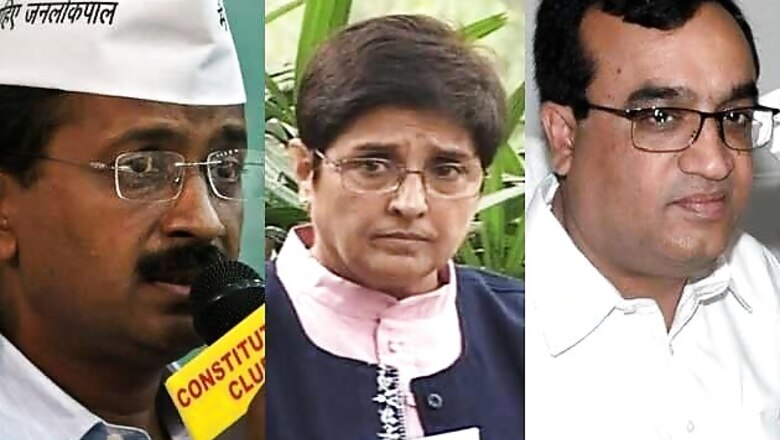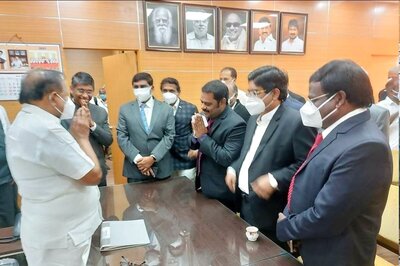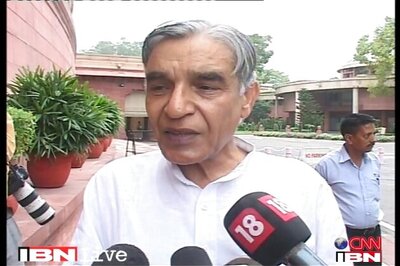
views
As India waits for the votes in the Delhi poll to be counted, one awaits an important turning point in the politics of 2015. If the AAP were to do well (as has been projected by all the Opinion polls), then the pace of the BJP juggernaut that has been speeding on for the last one year, would be dramatically halted. If the BJP were to defy the trends being predicted and manage to be ahead, then 'good days' would really be coming for the party.
In this interregnum, when Delhi has voted but the result is still locked in the EVMs, it would be useful to pause and assess the developments of the last few weeks. The BJP was hoping for a repeat of the Lok Sabha election trends when it won all the seats in Delhi. As one approached the elections, most observers believed that a win for the BJP in Delhi was all but sealed up. Something clearly changed or became transparently visible in the run up to the campaign. It is important to record that even though AAP did not win a single seat in Delhi in the Lok Sabha polls, it did manage to secure one-thirds of the votes. What appears to have now happened is that the party has expanded its support base to include important segments that had voted for the BJP in the Lok Sabha polls. Further, given the bi-polar nature of the contest (between the AAP and the BJP), the Congress voters appears to have consciously decided to shift to the AAP rather than allow their vote to be wasted. This seems especially true of the support that the Congress enjoyed among the minorities and the poorer segments of society. A middle class vote which was rock solid behind the BJP in the Lok Sabha polls, appears also to have now been split between the two principal opponents.
A range of factors explain the closeness of the contest. This is the first elections since the Lok Sabha polls, when the BJP was not the clear opposition that could attack the incumbent government. Who was the incumbent in Delhi remained unclear. Was it the AAP which resigned last February or was it the Congress who were in power in the Centre from February to June when Central rule was imposed in Delhi or was it the BJP who were in power at the Centre from July onwards. Further, this is the first time in an Assembly poll in the seven months where there has been a powerful, visible, articulate non-BJP Chief Ministerial face. Arvind Kejriwal's pre-eminent position in the Delhi contest, literally forced the BJP to alter strategy and announce a Chief Ministerial candidate. When Kiran Bedi's name was announced people saw it as a master stroke. Two weeks down the line, one is not sure whether it has had a positive impact. Firstly, it created a huge internal contradiction within the BJP with both the rank and file as well as the state level leadership being lukewarm to their newly anointed Chief Ministerial candidate, who was promoted to that position within less than 72 hours of joining the party. Secondly, one is not sure whether the new BJP Chief Ministerial candidature, brought the swing voters towards the party. One can raise doubts about her capacity to do the same for three reasons. Her leadership style which had more the approach of a police officer appeared not too well suited for political/ electoral leadership. Her many insensitive statements including the one inviting Kejriwal to join the BJP in order to secure an invitation to the Republic Day parade, did little to boost her image. Also, the BJP had hoped that by projecting Kiran Bedi they would be able to 'appropriate' the agenda and image that Kejriwal represented. This did not happen as Kejriwal had already been part of the political process and Bedi was a newcomer. Further, once the BJP Chief Ministerial candidate, Kiran Bedi changed her whole approach and focus and much of the earlier image she was know for was hardly visible either in her pronouncements or in the approach. She appeared to focus more on being like a disciplined BJP worker. Thus, if the trends as seen during the campaign are to be believed, the Kiran Bedi factor does not seem to have helped the BJP.
A few factors also seemed to work in favour of the AAP. Their support among the economically marginalized segments of Delhi society, appear to be strong. The Lok Sabha elections had shown that the BJP enjoyed a social funnel of support that was wide at the top (among the socially and economically more privileged) and narrow at the base. This trend seems to have become even more clear in Delhi with a clearly emerging class divide. Further, the strategy of the AAP to apologize for having abandoned party the last time around seems to have found favour with the electorate. It is rare that a party and its leadership publicly acknowledge a mistake. When they do so, the electorate seem to respond with grace.
What would the implications of the Delhi verdict be? They would have both an immediate impact as well as long term implications for the nature and direction of Indian politics. A victory for AAP would signal the beginning of the end of the 'honeymoon period' of the central government in general and the BJP and its leadership in particular. The BJP already seems to have sought to insure the central government and its leadership with prominent ministers asserting that a vote against the BJP is not a referendum on the Prime Minister and his government. At the end of voting, Kiran Bedi herself has declared that she would take responsibility if the party were not to do well in Delhi. While these statements do reflect a nervousness within the BJP leadership, a defeat in Delhi would surely place the Central government and its leadership on the backfoot. The forthcoming budget will be watched closely from the, prism of whether it has any signs of the good days that were promised. A defeat for the BJP, would surely bring to the fore internal contradictions within the party. The Party President could well become the target of criticism while the real aim of such discontent and rebellion could well be the Prime Minister himself. The murmurs from the frontal organizations supporting the BJP, which were heard during the last days of campaign could well become louder and possibly shriller. The party would already be concerned about the impact of the Delhi results on the forthcoming Bihar polls. The impact of the inability of the party to pursue an 'inclusive agenda' and its silence on important controversies raked up by its frontal organizations and some of its own leaders, would need to be recognized.
Whatever the outcome in Delhi, the Congress would clearly be facing a route with no signs of recovery since the Lok Sabha debacle. An victory for AAP could result in a realignment of the anti BJP forces, with the Congress not necessarily being the nucleus. Having been categorically pushed to the third place in one more state, the Congress would need to do some serious re-thinking on its future strategy. It may well seek consolation in the fact that the BJP was defeated with it playing a tangential role (its supporters moving to the AAP), the fact of the matter would be that the results (a victory for either AAP or BJP) would indicate a conscious and categorical rejection of the Congress.
An AAP victory would surely catapult the party to the centre stage of politics and a key force in non BJP camp. It would be useful to recall that in the last Delhi elections it was the presence of the very same AAP that prevented the BJP from coming to power. If the AAP were to win, Delhi politics would have once again ensured a change of course in national politics. A victory for AAP would have important implications for the internal dynamics of the party. For long voices of dissent where visible within the party resulting in leaders moving away from the party or being sidelined in the party. A victory in Delhi, may strengthen the forces and individuals rallying around Arvind Kejriwal and result in a greater Delhi-centric control over the party.
Given the close nature of the race, it would be unfair not to reflect on the impact of a BJP victory in Delhi. Such a victory would be read as a clear sign of the endorsing of the work done by the BJP government and its leadership at the national level. A BJP victory would place AAP as the lead opposition and the voices of dissent against Kejriwal's style of leadership would become louder. A BJP victory would be more damaging than an AAP victory for Congress in the short run, as its capacity to challenge the government in Delhi would be severely constrained. In the long run, for the Congress, either result (AAP or BJP victory) would set back the party and its role in national politics.
The nation awaits the Delhi verdict on Tuesday with anticipation as it could well change the course of Indian politics.
(Dr Shastri is a keen student of politics, an election analyst on CNN-IBN who is the Pro Vice Chancellor of Jain University at Bengaluru)


















Comments
0 comment